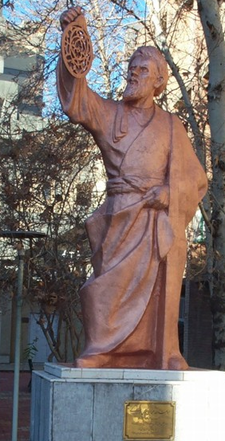Al-Khwārizmī
| Muḥammad ibn Mūsā al-Khwārizmī | |
|---|---|

Khwarizmi statute in Amir Kabir University, Tehran
|
|
| Born | c. 780 Khwarezm |
| Died | c. 850 |
| Academic work | |
| Era | Medieval era (Islamic Golden Age) |
| Notable ideas | Treatises on algebra and Indian numerals |
| Influenced | Abu Kamil |
Muḥammad ibn Mūsā al-Khwārizmī (Persian: محمد بن موسی خوارزمی, Arabic: محمد بن موسى الخوارزمی; c. 780 – c. 850) (Arabic pronunciation: [ælxɑːræzmiː]), formerly Latinized as Algoritmi, was a Persianmathematician, astronomer, and geographer during the Abbasid Caliphate, a scholar in the House of Wisdom in Baghdad.
In the 12th century, Latin translations of his work on the Indian numerals introduced the decimal positional number system to the Western world. Al-Khwārizmī's The Compendious Book on Calculation by Completion and Balancing presented the first systematic solution of linear and quadratic equations in Arabic. He is often considered one of the fathers of algebra. He revised Ptolemy's Geography and wrote on astronomy and astrology.
...
Wikipedia
